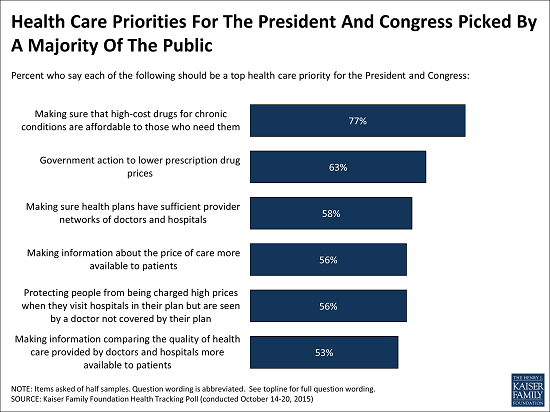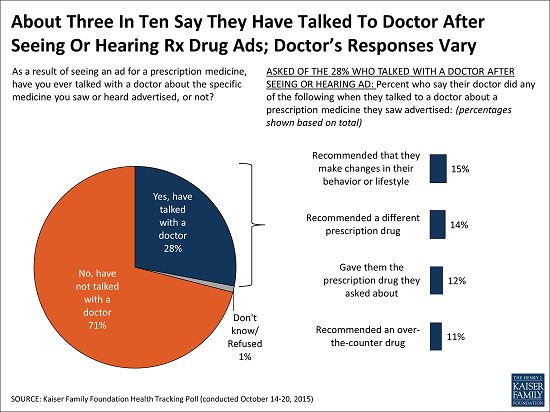
The independent source for health policy research, polling, and news.
Prescription Drug Costs Remain Atop the Public’s National Health Care Agenda, Well Ahead of Affordable Care Act Revisions and Repeal
Contacts
28% of Public Report Asking Doctor about a Drug They Saw Advertised, and 12% Say Their Doctor Prescribed It
Few Workers Expect Raises if Employers Reduce Health Benefits to Avoid Cadillac Tax as Many Economists Predict
With some presidential candidates laying out details of their health care platforms, the cost of prescription drugs remains at the top of the public’s health care priority list for the President and Congress, the October Kaiser Health Tracking Poll finds.
Making sure that high-cost drugs for chronic conditions, such as HIV, hepatitis, mental illness and cancer, are affordable for those who need them is the top priority, picked by more than three quarters of the public (77%). It was the top priority of Democrats, Republicans and independents alike, with at least seven in 10 of each group citing it.
The public ranks government action to lower prescription drug costs second, with 63 percent saying it is a top priority, including a majority of Republicans (56%). That’s similar to the share of Republicans who say repealing the entire Affordable Care Act is a top priority (58%).
Other priorities picked by more than half of the public include assuring provider networks are adequate, protections against surprise out of network bills, and increasing price and quality transparency.

In contrast, issues specific to the Affordable Care Act, such as repealing several of its provisions or the entire law, fall lower on the list. For example, while the public generally opposes the so-called Cadillac tax on more expensive employer health plans, just 30 percent pick eliminating it as a top priority, ranking it 12th on the poll’s priority list.
Economists generally believe that employers will raise workers’ wages if they reduce the cost of their health benefits to avoid the Cadillac tax. The poll finds few people with employer-sponsored coverage expect that to happen. Just 20 percent think their wages would increase if their employer offered less generous health benefits, while three quarters (76%) think wages would not increase.
Favorable and unfavorable views of the ACA overall were tied this month, with 42 percent holding each view. Compared to when most of the law’s provisions were just taking effect in early 2014, more now say their impression of the law is based on their own experience (35% now, up from 23% in February 2014), while fewer say it is based on what they’ve seen in the media (30% now, down from 44% in February 2014).
The survey also probes the public’s experiences with drug advertisements. A large majority (82%) report they’ve seen or heard such advertising, and 28 percent say they have talked with a doctor about a specific drug they saw advertised.
One in eight adults (12%) say they were given a specific drug after asking a doctor about its advertisements;15 percent say the doctor recommended changes in their behavior or lifestyle;14 percent say the doctor recommended a different prescription drug, and 11 percent say the doctor recommended an over-the-counter option. These findings are similar to the results of previous Kaiser polling in 2008.

About half of the public (51%) say prescription drug advertising is mostly a good thing. Half (50%) also say drug advertisements do a good or excellent job of telling consumers which condition or disease the drug is designed to treat, and nearly as many say the ads do at least a good job telling consumers about the potential benefits (47%) and potential side effects (44%).
The poll also finds a majority (57%) believes that drug companies spend too much money advertising to patients. A similar majority says the same about money spent marketing to doctors (62%), and two thirds (67%) say drug companies have a lot of influence over what doctors prescribe to their patients. In addition, 89 percent of the public favor having the Food and Drug Administration review drug ads for accuracy and clarity before the public sees them, something it does not do now.
The poll was designed and analyzed by public opinion researchers at the Kaiser Family Foundation and was conducted from October 14 to 20, 2015 among a nationally representative random digit dial telephone sample of 1,203 adults. Interviews were conducted in English and Spanish by landline (481) and cell phone (722). The margin of sampling error is plus or minus 3 percentage points for the full sample. For results based on subgroups, the margin of sampling error may be higher.